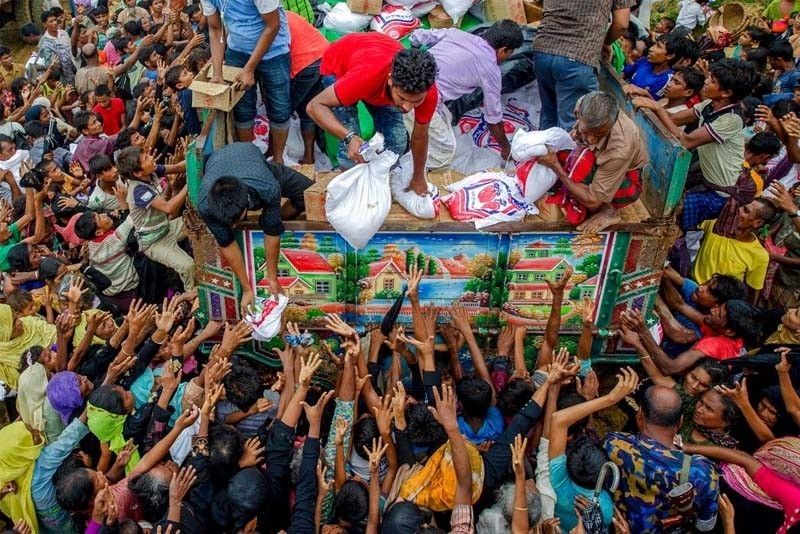Philippines votes vs UN resolution condemning HR abuses in Myanmar

MANILA, Philippines — The Philippines, along with China and Cuba, voted against a resolution of the United Nations Human Rights Council (UNHRC) condemning the continuing human rights abuses in Myanmar.
The resolution, which expressed grave concern at continuing reports of serious human rights violations and abuses in the Southeast Asian nation, was adopted during the 40th regular session of the UNHRC in Geneva last week.
Thirty-seven of 47 member-nations of the UNHRC voted in favor of the resolution, which was submitted by Romania in behalf of the European Union.
Seven countries abstained including Angola, Cameroon, Congo, India, Japan, Nepal and Senegal.
The Philippines, the only Southeast Asian nation in the body, has historically voted against or expressed reservations on UN resolutions concerning human rights abuses in Myanmar.
During the 39th UNHRC session in September last year, the Philippines voted along with China and Burundi against the resolution on the situation of Rohingya Muslims in Myanmar.
In 2017, it voted against the draft UN resolution calling on Myanmar authorities to end a military campaign against Rohingya Muslims in the nation’s Rakhine state.
Earlier that year, the Philippines also told the UNHRC that it would not support the creation of a fact-finding mission to look into the human rights abuses in Myanmar.
“The Philippines, in a general comment, supported Myanmar’s democratization efforts. There were complex issues in Rakhine state, and the Philippines supported the provision of assistance to Myanmar,” noted the UNHRC after its 34th regular session in March 2017.
“It was with that in mind that the Philippines would not break consensus on the resolution as a whole, yet did not support the establishment of an international fact-finding mission,” it added.
Continuing abuses
The latest UNHRC resolution urged the Myanmar military and security forces to immediately end violence and all violations of international law in the country, noting cases of sexual and gender-based violence and violations and abuses against children.
The resolution also expressed serious concern about the recent escalation of violence in the Rakhine state between the armed forces of Myanmar and an insurgent group in the area, as well as reports of new internal and cross-border displacements of civilians due to the ongoing conflict.
It called upon the government to ensure the protection of the human rights of all persons and to take all measures necessary to ensure accountability and to end impunity for all violations and abuses of human rights.
The UNHRC urged the government to cooperate fully and grant full, unrestricted and unmonitored access to all UN mandate holders and human rights mechanisms, including the special rapporteur on the human rights situation in Myanmar and the independent international fact-finding mission created to monitor the human rights situation in the country.
It also urged Myanmar officials to safeguard those who report violations and abuses, release unconditionally all remaining political prisoners including journalists and promote the inclusion, rights and dignity of all people living in the country,
The human rights body welcomed developments in the country, including the steps taken by the government toward establishing a national strategy for the sustainable closure of camps for internally displaced persons.
It said the government should expedite efforts to eliminate statelessness and the systematic and institutionalized discrimination against members of ethnic and religious minorities.
Massive violations
In a report last year, independent international fact-finding mission on Myanmar revealed massive violations committed by the country’s military, Tatmadaw, against the people in Rakhine, Kachin and Shan states.
“During their operations the Tatmadaw has systematically targeted civilians, including women and children, committed sexual violence, voiced and promoted exclusionary and discriminatory rhetoric against minorities and established a climate of impunity for its soldiers,” said Marzuki Darusman, chair of the mission.
“The full findings… show why, in our report to the Human Rights Council, we insist that the perpetrators of the gross human rights violations and international crimes committed in Rakhine, Kachin and Shan states must not go unpunished. They also show why the top generals should be investigated and prosecuted for genocide in Rakhine state. I have never been confronted by crimes as horrendous and on such a scale as these,” he added.
Myanmar’s de facto leader, democracy icon and Nobel Peace Prize winner Aung San Suu Kyi, has received criticisms over continuing human rights violations in the country under her rule.
- Latest
- Trending




























